八年级英语Past and present
江苏新教材牛津英语八年级下 Unit1 Past and present Welcome to the unit
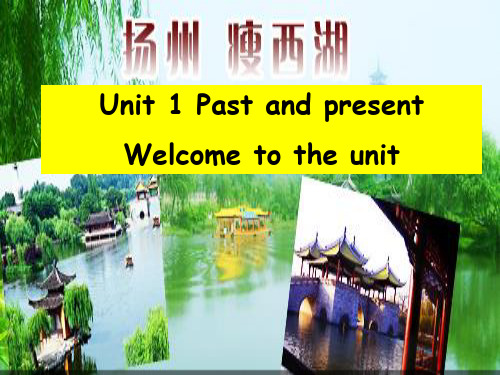
Listen and answer
1. Does Hobo think Eddie has changed? Why? Yes. Because he used to share food with him.
Listen and answer
2. What was in the bowl an hour ago? Hobo’s food .
2. 技能目标: 1)了解北京不同时代的交通工具。 2)谈论自己、家人和朋友过去和现在使用的 不同交通工具。 3)初步认识现在完成时。 3. 情感目标:通过交通方式的变化,了解并 体会北京的巨大变化。
Lead-in
Happy New Year, boys and girls! We’re glad to be back at school again. You are one year older and you’re taller. All of you have changed.
Unit 1 Past and present Welcome to the unit
1.知识目标: 学习词汇:past , present, just 学习词组: used to do sth, Share sth with sb, go to school, by bike, take a bus 学习句子: You used to share food with me! It took a long time to wait for the next one.
Homework 1. Recite the sentences of the comic pictures. 2. 翻译下列词组 1)在碗中 2)过去常常 3)和……一起分享 4)家乡 5)在不同的时代 6)在过去的二十年中 7)北京的变化 8)一项历史项目
牛津译林版八年级英语下册8Bunit1 past and present 课文要点全解
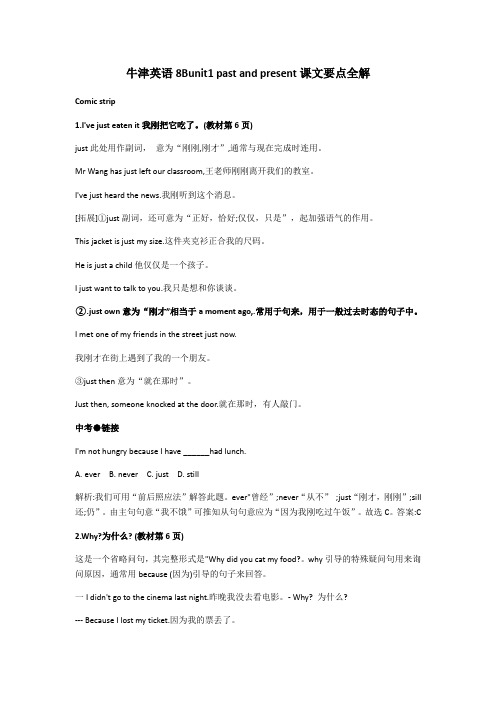
牛津英语8Bunit1 past and present课文要点全解Comic strip1.I've just eaten it我刚把它吃了。
(教材第6页)just此处用作副词,意为“刚刚,刚才”,通常与现在完成时连用。
Mr Wang has just left our classroom,王老师刚刚离开我们的教室。
I've just heard the news.我刚听到这个消息。
[拓展]①just副词,还可意为“正好,恰好;仅仅,只是”,起加强语气的作用。
This jacket is just my size.这件夹克衫正合我的尺码。
He is just a child他仅仅是一个孩子。
I just want to talk to you.我只是想和你谈谈。
②.just own意为“刚才”相当于a moment ago,.常用于句来,用于一般过去时态的句子中。
I met one of my friends in the street just now.我刚才在街上遇到了我的一个朋友。
③just then意为“就在那时”。
Just then, someone knocked at the door.就在那时,有人敲门。
中考●链接I'm not hungry because I have ______had lunch.A.everB. neverC. justD. still解析:我们可用“前后照应法”解答此题。
ever"曾经”;never“从不”;just“刚才,刚刚”;sill 还;仍”。
由主句句意“我不饿”可推知从句句意应为“因为我刚吃过午饭”。
故选C。
答案:C2.Why?为什么? (教材第6页)这是一个省略问句,其完整形式是"Why did you cat my food?。
why引导的特殊疑问句用来询问原因,通常用because (因为)引导的句子来回答。
八年级英语下册 Unit 1 Past and present重点语法和句型 牛津版

Unit 1 Past and present一. 教学内容:Unit 1 Past and presentwords, phrases and sentences二. 教学目标:掌握Unit 1的词汇及词性变化和课文中的重点词组、句型的结构和用法Unit 1 Past and present(一)基础词汇过去,往事 past目前,现在 present(n. 现在,通常与过去、将来相对应。
The past, the present and the future . 过去、现在和将来。
at present. 此刻、现在: I’m afraid I can’t help you just at present. ----- I’m too busy. 很抱歉,我现在帮不了你,----- 实在太忙了。
adj. 现在的。
the present day当今、现今。
Most young people enjoy listening to popular music the present day. )刚刚 just(just, adv. 刚才。
常用于完成时态,在美式英语中用于一般过去时。
)I have just seen John. 我刚才见到约翰了。
I just saw him. (a moment ago). ( U. S)我(几分钟前)看到他的。
( U. S)自……以来 since(since. 后面通常接点时间来表示一段时间。
例如:since 1984 自从1984年一直到现在。
since 3 days ago. 自从三天前一直到现在,也可以说成for 3 days 通常用how long 提问。
How long has your uncle lived here? Since 1980. )南方的 southern到……时 till已婚的 married(marry. vt. vi marry sb. 与某人结婚;嫁或娶某人。
江苏新教材牛津英语八年级下 Unit1 Past and present Grammar
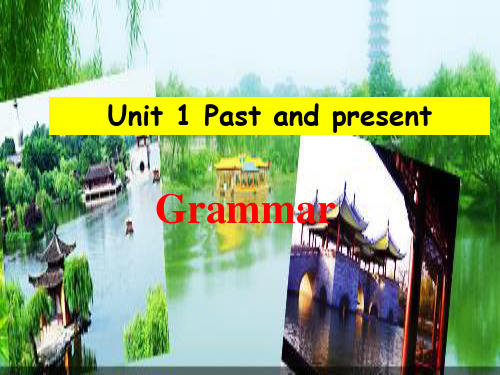
More practice
hasn’t finished (not finish) the 1. He ______________
homework yet. He will try to finish it
quickly. 2. My family ________ has lived (live) in Nanjing since 1996. 3. _____ ______ (know) him since Have you known then?
over the past century. From this have learnt (learn) film, I (4)______________ more about Beijing’s past and
present. have heard Sandy: Oh, I think I (5)__________(hear) about the film. Do you plan to see it again? Millie: Yes, I’d like to.
7. My father went to Beijing two weeks haven’t seen (not see) him since ago. I____________ then. 8. ____ Has Tom _______ written (write) letters to you recently? 9. Jack’s mother isn’t at home. She ________ has gone (go) to the supermarket.
3. 现在完成时的一般疑问句
句型 Have/Has+主语+过去分词 Have you….? Yes, I have. No, I haven’t. Has he….? Yes, he has. No, he hasn’t.
八年级英语下册 Unit 1 Past and present语法点拨 牛津版

Unit 1 Past and present一、教学内容:Unit 1 Past and present Language points二、教学目标:掌握课文中的重点语言点及用法1. He used to live in Nanjing.他过去住在某某。
used to do something. 表示“过去常常做某事”be used to doing something表示“习惯于做某事”be used to do 表示“被用来做某事”,主语常常是物。
e.g. ①. I used to get up at 6 o’clock. But now I often get up at 7 o’clock.②. We are used to reading English very early in the morning.③. A knife is used to cut something.(1) My grandmother________ a history teacher in a middle school.(过去曾是)(2) ________ you ________in Beijing now?(习惯住在)(3) Mobile phones________ municate with other people. (被用来)2. We lived together until 1965 when I got married. 我们一起住直到1965年我结婚。
1) till ( prep& conj. 介词/连词) 和until类似,常用于口语中,但不可用在句首。
肯定句(谓语动词是延续性的)+ till… “到……为止”I will stay here till 6:00 p.m. then I will go.否定句not(谓语动词是短暂性的)+ till… “直到……才……”He didn’t leave till it rained heavily.句首只能用untilUntil he returns, I can do nothing.他不回来,我什么也不能做。
2020年牛津译林版八年级英语下册Unit1单词词组和语法讲解+训练
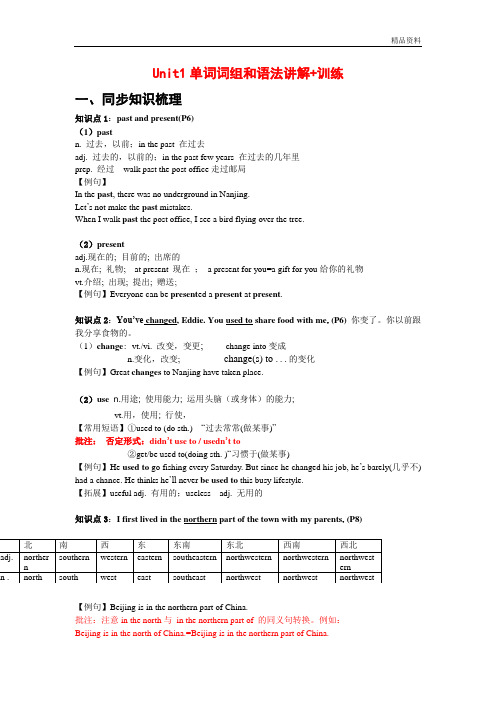
Unit1单词词组和语法讲解+训练一、同步知识梳理知识点1:past and present(P6)(1)pastn. 过去,以前;in the past 在过去adj. 过去的,以前的;in the past few years 在过去的几年里 prep. 经过 walk past the post office 走过邮局 【例句】In the past , there was no underground in Nanjing. Let ’s not make the past mistakes.When I walk past the post office, I see a bird flying over the tree.(2)presentadj.现在的; 目前的; 出席的n.现在; 礼物; at present 现在 ; a present for you=a gift for you 给你的礼物 vt.介绍; 出现; 提出; 赠送;【例句】Everyone can be present ed a present at present .知识点2:You’ve changed, Eddie. You used to share food with me .(P6) 你变了。
你以前跟我分享食物的。
(1)change : vt./vi. 改变,变更; change into 变成 n.变化,改变; change(s) to ...的变化 【例句】Great changes to Nanjing have taken place.(2)use n.用途; 使用能力; 运用头脑(或身体)的能力;vt.用,使用; 行使,【常用短语】①used to (do sth.) “过去常常(做某事)” 批注: 否定形式:didn ’t use to / usedn ’t to②get/be used to(doing sth. )“习惯于(做某事)【例句】He used to go fishing every Saturday. But since he changed his job, he ’s barely(几乎不) had a chance. He thinks he ’ll never be used to this busy lifestyle. 【拓展】useful adj. 有用的;useless adj. 无用的知识点3:I first lived in the northern part of the town with my parents .(P8)【例句】Beijing is in the northern part of China.批注:注意in the north 与 in the northern part of 的同义句转换。
八年级英语下册Unit1Pastandpresent语法解析牛津版
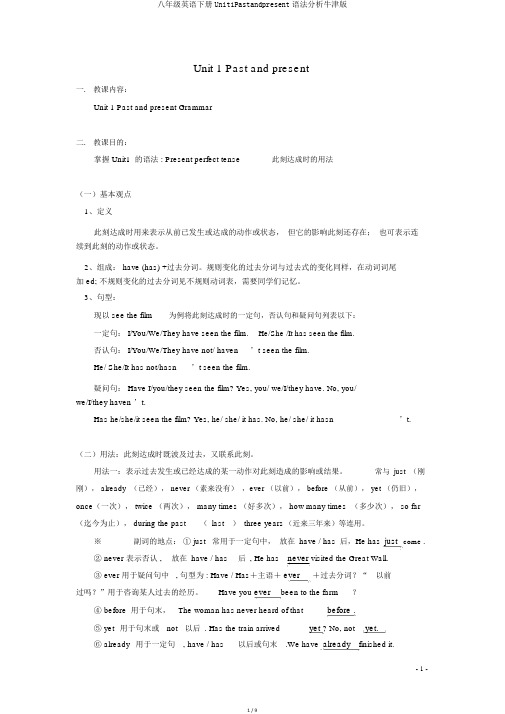
Unit 1 Past and present一.教课内容:Unit 1 Past and present Grammar二.教课目的:掌握 Unit1 的语法 : Present perfect tense此刻达成时的用法(一)基本观点1、定义此刻达成时用来表示从前已发生或达成的动作或状态,但它的影响此刻还存在;也可表示连续到此刻的动作或状态。
2、组成: have (has) +过去分词。
规则变化的过去分词与过去式的变化同样,在动词词尾加 ed; 不规则变化的过去分词见不规则动词表,需要同学们记忆。
3、句型:现以 see the film为例将此刻达成时的一定句,否认句和疑问句列表以下:一定句: I/You/We/They have seen the film.He/She /It has seen the film.否认句: I/You/We/They have not/ haven’t seen the film.He/ She/It has not/hasn’t seen the film.疑问句: Have I/you/they seen the film? Yes, you/ we/I/they have. No, you/we/I/they haven ’t.Has he/she/it seen the film? Yes, he/ she/ it has. No, he/ she/ it hasn’t.(二)用法:此刻达成时既波及过去,又联系此刻。
用法一:表示过去发生或已经达成的某一动作对此刻造成的影响或结果。
常与just(刚刚), already (已经), never (素来没有),ever (以前), before (从前), yet (仍旧),once(一次), twice (两次), many times (好多次), how many times (多少次), so far (迄今为止), during the past(last)three years(近来三年来)等连用。
Units 1-8重要短语归纳2022-2023学年牛津译林版英语八年级下册

Unit 1 Past and presentWelcome to the unit1. past and present 过去和现在2. in the bowl 在碗里3. an hour ago 一小时前4. —Have you seen my food? 你见过我的食物吗?—Yes, I’ve just eaten it. 是的,我刚把它吃了。
5. used to share food with me 过去常常和我分享食物6. be so kind to me 对我那么好7. transport at different times 不同时代的交通工具8. by bike/ bus/ underground/ car/ taxi/ coach/ train/ plane骑自行车/乘公交车/地铁/汽车/出租车/长途汽车/火车/飞机9. Why didn’t you take a bus? 你为什么不乘公交车呢?10. too many people 太多人11. It took a long time to wait for the next bus. 花费很长时间等到下一班公交车。
12. It’s easy and fast (to go to school by bus). (乘公交车去上学)既简便又快捷。
Reading1. I’ve lived here since I was born. 我自出生就住在这里。
2. move house 搬家3. in the northern part of town 在城镇的北部4. get married 结婚5. move two blocks away 搬离两个街区6. We’ve lived in this area since then. 从那时起我们就住在这个地区了。
7. over the years 在这几年中8. turn part of the town centre into a new park 将镇中心的部分变为一个新公园9. a steel factory 一个钢厂10. put the waste into the river 将废物投入河中11. realize the problem 意识到这个问题12. take action to improve the situation 采取措施改善情况13. in some ways 在某种程度上14. move away 搬离15. know little about… 对……知道很少know nothing about…对……一无所知16. It has become impossible for us to see each other as often as before.我们已经不可能像以前那样经常见到彼此了。
牛津译林版 8B八年级下册 Unit1 Past and present 知识点梳理
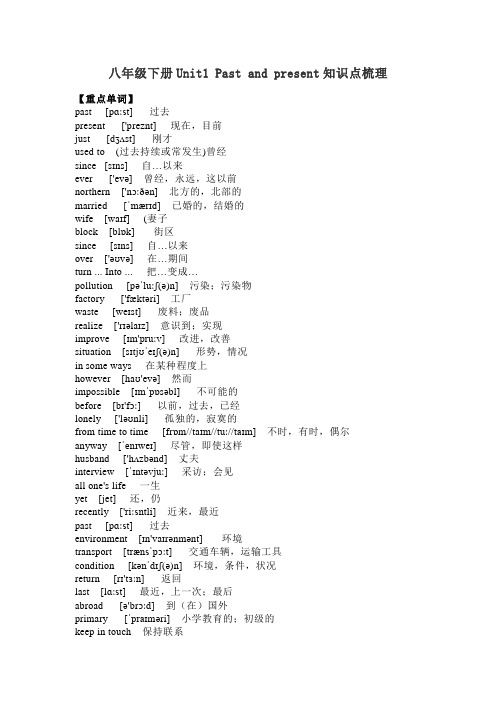
八年级下册Unit1 Past and present知识点梳理【重点单词】past [pɑːst]过去present ['preznt] 现在,目前just [dʒʌst] 刚才used to (过去持续或常发生)曾经since [sɪns] 自…以来ever ['evə] 曾经,永远,这以前northern ['nɔːðən] 北方的,北部的married [ˈmærɪd] 已婚的,结婚的wife [waɪf] (妻子block [blɒk] 街区since [sɪns] 自…以来over ['əʊvə] 在…期间turn ... Into ... 把…变成…pollution [pəˈluːʃ(ə)n] 污染;污染物factory ['fæktəri] 工厂waste [weɪst] 废料;废品realize ['rɪəlaɪz] 意识到;实现improve [ɪm'pruːv]改进,改善situation [sɪtjʊˈeɪʃ(ə)n] 形势,情况in some ways 在某种程度上however [haʊ'evə] 然而impossible [ɪmˈpɒsəbl] 不可能的before [bɪ'fɔː]以前,过去,已经lonely ['ləʊnli] 孤独的,寂寞的from time to time [frɒm//taɪm//tuː//taɪm] 不时,有时,偶尔anyway [ˈenɪweɪ] 尽管,即使这样husband ['hʌzbənd] 丈夫interview [ˈɪntəvjuː]采访;会见all one's life 一生yet [jet] 还,仍recently ['riːsntli]近来,最近past [pɑːst]过去environment [ɪn'vaɪrənmənt] 环境transport [trænsˈpɔːt]交通车辆,运输工具condition [kənˈdɪʃ(ə)n] 环境,条件,状况return [rɪ'tɜːn]返回last [lɑːst]最近,上一次;最后abroad [ə'brɔːd]到(在)国外primary [ˈpraɪməri] 小学教育的;初级的keep in touch 保持联系communicate [kəˈmjuːnɪkeɪt] 交流,交际communication [kəmjuːnɪˈkeɪʃ(ə)n] 交流,交际exactly [ɪg'zæktli] (答语)正是,没错be/get used to 习惯于,适应于narrow [ˈnærəʊ] 狭窄的open space 开阔的空地【重点词组】1.in the bowl an hour ago一个小时之前在碗里的ed to do sth.过去常常做某事be used to doing sth. 习惯于做某事be used to do sth. 被用来做某事3.do a history project on the changes in Beijing over the years做个有关这些年北京的变化的历史调查4.write a report on the changes in your home town 写一个有关你家乡的变化的报道5.know about the different forms of transport 对不同形式的交通工具很了解6.talk about transport at different times 讨论不同时期的交通工具7.take turns to do sth.=do sth. by turns 轮流做某事8.go to school by bike = ride a bike to school 骑自行车去学校9.wait for the next one 等下一辆车10.go to school by bus= take a bus to school= go to school on the bus乘公交车去学校11.interview sb. to get some information 为了得到些信息采访某人12.know sunshine town very well 对阳光镇很了解13.be born 出生14.move house 搬家15.in the northern part of town 在这个镇的西部16.get married to sb.= marry sb.= be married to sb.和某人结婚17.marry sb. to sb. 把某人嫁给某人18.move two blocks away搬到两个街区以外19.live in this area 住在这个地区20.since then 自从那以后since I was born/ since last Saturday/since three days ago21.over the years 这些年over the past century 在过去的几个世纪22.in the town centre= in the centre of the town 在镇中心23.turn/change/put sth. into 把某物变成某物24.a steel factory 一个钢铁厂25.put the waste into the river 把垃圾倒入河里put down 记下put away 收好put on 穿上put off 推迟、延期26.take action to improve the situation采取行动改善这种情况27.in some ways 在某些方面on the way (to ) 在……的路上by the way 顺便说no way 没门in any way 无论如何28.most of my old friends大部分我的老朋友29.move away 搬走/move to(into) another town30.see each other as often as before像以前一样经常看到对方31.play cards and Chinese chess 打牌和下棋32.feel a bit lonely 感到有点孤单33.from time to time = at times = sometimes 有时34.because of being alone 因为独自一人35.a group of buildings with streets on all sides街道两边全是高楼on both sides/ on each side36.interview sb.= have an interview with sb. 采访某人37.all his life 整个他的一生38.in the past 在过去at present 现在39.make some notes 做些笔记40.waste sth. on sth./ sb.浪费某物在某物/某人上41.repair over ten bicycles= repair more than ten bicycles修理超过10辆自行车42.teach sb. a lot about the history of China教我很多有关中国的历史43.talk about a film about the history of Beijing讨论一个有关北京历史的影片44.learn more about Beijing’s past and present对北京的过去和现在了解更多45.hear about/of 听说hear from sb.= receive/ get one’s letter=receive/get a letter of sb.收到某人来信46.living conditions 居住条件47.return sth. to sb. 把某物归还给某人48.go abroad 去国外at home or abroad 在国内外49.at primary school 在小学50.keep in touch with each other 互相保持联系51.make communication much easier使得联系更容易Communicate with sb.和某人保持联系52.take place发生(有目的有计划的)、举行happen发生(偶然发生)53.green hills all around到处都是绿山54.a river runs through the centre of town一条小河穿过镇中心55.get used to the changes of life习惯了生活的变化56.on one’s own = by oneself = alone独自57.throw rubbish 扔垃圾58.in some large open spaces在一些大的开阔的地方59.move into new flats搬到新公寓去60.in their free time在他们业余时间61.travel around the town在镇里转转62.have their own cars= have cars of their own有他们自己的汽车e the new words to talk about my hometown用些新词来讨论我的家乡e facts to support my opinions用事实来支持我的观点【重点句型】1.There were always too many people on the bus, and it took a long time to wait for the next one.公共汽车上总是有太多的人,并且要花费很长时间等待下一趟。
初中英语 牛津译林八下Unit1知识梳理
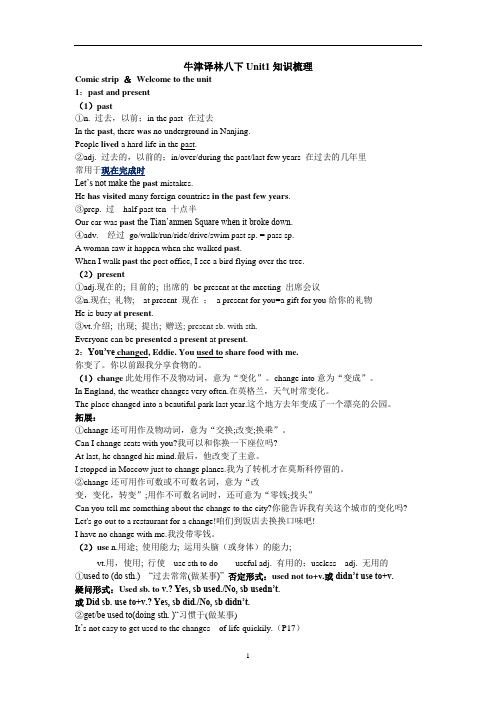
牛津译林八下Unit1知识梳理Comic strip &Welcome to the unit1:past and present(1)past①n. 过去,以前;in the past 在过去In the past, there was no underground in Nanjing.People lived a hard life in the past.②adj. 过去的,以前的;in/over/during the past/last few years 在过去的几年里常用于现在完成时Let’s not make the past mistakes.He has visited many foreign countries in the past few years.③prep. 过half past ten 十点半Our car was past the Tian’anmen Square when it broke down.④adv. 经过go/walk/run/ride/drive/swim past sp. = pass sp.A woman saw it happen when she walked past.When I walk past the post office, I see a bird flying over the tree.(2)present①adj.现在的; 目前的; 出席的be present at the meeting 出席会议②n.现在; 礼物; at present 现在; a present for you=a gift for you给你的礼物He is busy at present.③vt.介绍; 出现; 提出; 赠送; present sb. with sth.Everyone can be present ed a present at present.2:You’ve changed, Eddie. You used to share food with me.你变了。
八年级英语下册Unit1PastandPresent词组整理牛津版
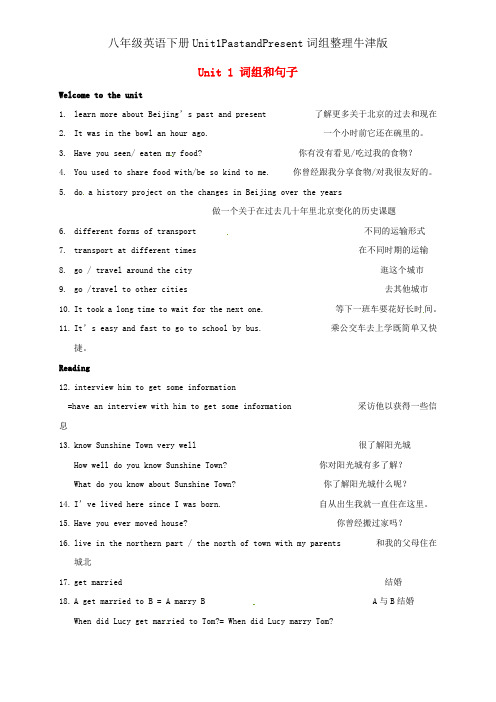
Unit 1 词组和句子Welcome to the unit1.learn more about Beijing’s past and present 了解更多关于北京的过去和现在2.It was in the bowl an hour ago. 一个小时前它还在碗里的。
3.Have you seen/ eaten m y food? 你有没有看见/吃过我的食物?4.You used to share food with/be so kind to me. 你曾经跟我分享食物/对我很友好的。
5.do a history project on the changes in Beijing over the years做一个关于在过去几十年里北京变化的历史课题6.different forms of transport 不同的运输形式7.transport at different times 在不同时期的运输8.go / travel around the city 逛这个城市9.go /travel to other cities 去其他城市10.It took a long time to wait for the next one. 等下一班车要花好长时间。
11.It’s easy and fast to go to school by bus. 乘公交车去上学既简单又快捷。
Reading12.interview him to get some information=have an interview with him to get some information 采访他以获得一些信息13.know Sunshine Town very well 很了解阳光城How well do you know Sunshine Town? 你对阳光城有多了解?What do you know about Sunshine Town? 你了解阳光城什么呢?14.I’ve lived here since I was born. 自从出生我就一直住在这里。
2020春牛津译林版英语八下Unit1PastandPresentword重点词组句型及语法
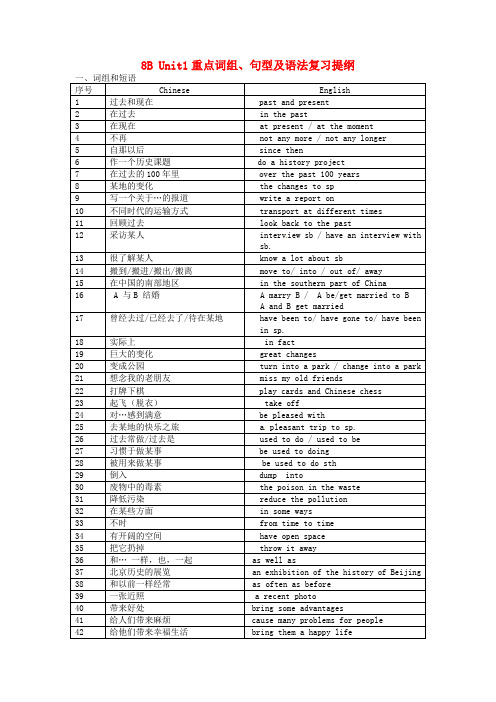
8B Unit1重点词组、句型及语法复习提纲序号Chinese English1 过去和现在past and present2 在过去in the past3 在现在at present / at the moment4 不再not any more / not any longer5 自那以后since then6 作一个历史课题do a history project7 在过去的100年里over the past 100 years8 某地的变化the changes to sp9 写一个关于…的报道write a report on10 不同时代的运输方式transport at different times11 回顾过去look back to the past12 采访某人interv iew sb / have an interview withsb.13 很了解某人know a lot about sb14 搬到/搬进/搬出/搬离move to/ into / out of/ away15 在中国的南部地区in the southern part of China16 A 与B 结婚 A marry B / A be/get married to BA andB get married17 曾经去过/已经去了/待在某地have been to/ have gone to/ have beenin sp.18 实际上in fact19 巨大的变化great changes20 变成公园turn into a park / change into a park21 想念我的老朋友miss my old friends22 打牌下棋play cards and Chinese chess23 起飞(脱衣)take off24 对…感到满意be pleased with25 去某地的快乐之旅a pleasant trip to sp.26 过去常做/过去是used to do / used to be27 习惯于做某事be used to doing28 被用来做某事be used to do sth29 倒入dump into30 废物中的毒素the poison in the waste31 降低污染reduce the pollution32 在某些方面in some ways33 不时from time to time34 有开阔的空间have open space35 把它扔掉throw it away36 和…一样,也,一起as well as37 北京历史的展览an exhibition of the history of Beijing38 和以前一样经常as often as before39 一张近照 a recent photo40 带来好处bring some advantages41 给人们带来麻烦cause many problems for people42 给他们带来幸福生活bring them a happy life43 一个新的旅游胜地 a new tourist attraction44 想起think of45 确保做某事be sure to do46 远离be far from47 一点也不n ot… a bit48 非常n ot…a little49 周围的青山绿水green hills and rivers around50 把某物落在某地leave sth sp51 和某人一起拍照take photos with sb52 拍某人的照片take photos of sb53 处于使用中be in service / be in use54 乘…去某地take … to sp /go to sp by….55 靠近next to56 更少的发展less development57 放学后在学校和朋友聊天stay after school to chat with friends58 同意某人的观点agree with sb59 同意做某事agree to do60 有更多的时间放松自己have more time to relax oneself61 在小学in primary school62 有同感have the same feeling63 自然美景natural beauty64 顺便问一下by the way二、重点句子及句型:1. ----Eddie,have you seen my food ? ----Yes. I’ve just eaten it.factory used to dump its waste into the river.(didn’t use to do/used not to do)have known the place since I was very young.lived together till 1965 when I got married.5.China has changed a lot. = Great changes have happened to China.= There have been gr eat changes in China.of them have moved to other areas and I feel a bit lonely from time to time.cannot see their friends as often as before.government realized it was a very serious problem and took action to reduce the pollution.has lived with Millie since he was born./last year/3years a go.have gone to the cinema already. John has been to the USA a few times. come to school by bus on my ownthinks he is unlucky enough to see the changes to Sunshine Town.will stay there for a whole week to enjoy the sun and the beach.wish you a happy holiday. = I wish you will have a happy holiday.changes to Moonlight Town have brought many benefits but they have also caused many problems for people.16. Some animals and plants have lost their living areas because of these change s.17. It no longer provides a good environment for wildlife. = It does n’t providea good environment for wildlife any longer., let me show you how to get to the train station.三、语法:1.现在完成时用法一:表示过去发生的动作对现在产生影响。
Unit+1+Past+and+present知识点整理 牛津译林版英语八年级下册
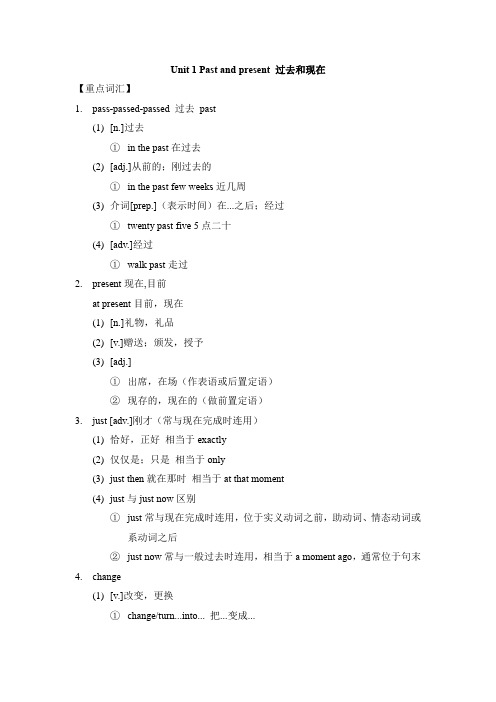
Unit 1 Past and present 过去和现在【重点词汇】1.pass-passed-passed 过去past(1)[n.]过去①in the past在过去(2)[adj.]从前的;刚过去的①in the past few weeks近几周(3)介词[prep.](表示时间)在...之后;经过①twenty past five 5点二十(4)[adv.]经过①walk past走过2.present现在,目前at present目前,现在(1)[n.]礼物,礼品(2)[v.]赠送;颁发,授予(3)[adj.]①出席,在场(作表语或后置定语)②现存的,现在的(做前置定语)3.just [adv.]刚才(常与现在完成时连用)(1)恰好,正好相当于exactly(2)仅仅是;只是相当于only(3)just then就在那时相当于at that moment(4)just与just now区别①just常与现在完成时连用,位于实义动词之前,助动词、情态动词或系动词之后②just now常与一般过去时连用,相当于a moment ago,通常位于句末4.change(1)[v.]改变,更换①change/turn...into... 把...变成...(2)[n.]变化,变革;零钱(不可数名词)5.since[conj.]&[prep.]自……以来6.ever[adv.]曾经7.northern北方的,北部的southern western eastern8.married已婚的,结婚的(1)get married结婚(2)be married已婚(3)be/get married to sb.与某人结婚9.wife妻子-wives[pl.](1)knife-knives(2)wolf-wolves(3)thief-thieves(4)half-halves(5)leaf-leaves10.away[adv.]离开,在(某距离)处(1)go away离开(2)right away立刻(3)take away带走(4)run away逃离(5)put away收起来(6)far away远离(7)keep...away from... 使...远离...11.block街区12.pollution污染;污染物(1)[v.]pollute(2)light pollution光污染(3)air pollution空气污染(4)water pollution水污染(5)noise pollution噪声污染13.problem[n.]问题,难题(1)question与ask/answer(2)problem难以解决问题solve/work out连用14.factory工厂15.waste(1)废料;废品(不可数名词)(2)[n.]浪费,可以和冠词a连用(3)[adj.]废弃的,无用的;荒芜的(4)[v.][新义]浪费,滥用①waste sth. on sth.浪费某物在某物/事上②waste sth. (in) doing sth.浪费某物做某事16.realize[v.]意识到;实现(1)realize实现,是及物动词,被实现(2)come true实现,成为现实,是不及物动词,不能用于被动语态17.situation形势,情况18.husband丈夫19.impossible[adj.]不可能的(1)impossibly[adv.](2)possible[adj.]-possibly[adv.](3)possibility[n.]可能性20.interview采访;会见[新义]n.对……进行面试;采访21.environment环境condition环境,条件,状况22.lonely和alone(1)lonely形容词孤独的,强调人的内心感受;偏僻的。
2020年春牛津译林版英语八年级下册— Unit1知识点梳理

Unit 1 Past and present1.1 Comic strip & Welcome to the unit1:past and present(1)pastn. 过去,以前;in the past 在过去adj. 过去的,以前的;in the past few years 在过去的几年里prep. 经过walk past the post office走过邮局In the past, there was no underground in Nanjing.Let’s not make the past mistakes.When I walk past the post office, I see a bird flying over the tree.(2)presentadj.现在的; 目前的; 出席的n.现在; 礼物; at present 现在;a present for you=a gift for you给你的礼物vt.介绍; 出现; 提出; 赠送;Everyone can be present ed a present at present.2:You’ve changed, Eddie. You used to share food with me.你变了。
你以前跟我分享食物的。
(1)change: vt./vi. 改变,变更; change into变成n.变化,改变; change(s) to ...的变化Great changes to Nanjing have taken place.(2)use n.用途; 使用能力; 运用头脑(或身体)的能力;vt.用,使用; 行使,①used to (do sth.) “过去常常(做某事)” 批注:否定形式:didn’t use to / usedn’t to②get/be used to(doing sth. )“习惯于(做某事)He used to go fishing every Saturday. But since he changed his job, he’s barely(几乎不) had a chance. He thinks he’ll never be used to this busy lifestyle.useful adj. 有用的;useless adj. 无用的3:I first lived in the northern part of the town with my parents.Beijing is in the northern part of China.批注:注意in the north与in the northern part of 的同义句转换。
(word完整版)译林版英语八年级下册单词表
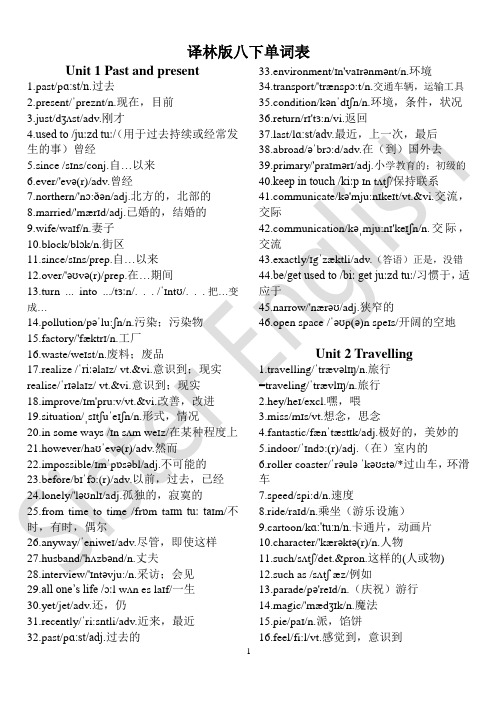
Unit 1 Past and present1.past/pɑ:st/n.过去2.present/ˈpreznt/n.现在,目前3.just/dʒʌst/adv.刚才ed to /juːzd tuː/(用于过去持续或经常发生的事)曾经5.since /sɪns/conj.自…以来6.ever/'evə(r)/adv.曾经7.northern/'nɔ:ðən/adj.北方的,北部的8.married/'mærɪd/adj.已婚的,结婚的9.wife/waɪf/n.妻子10.block/blɔk/n.街区11.since/sɪns/prep.自…以来12.over/'əʊvə(r)/prep.在…期间13.turn ... into .../tɜːn/. . . /ˈɪntʊ/. . . 把…变成…14.pollution/pəˈlu:ʃn/n.污染;污染物15.factory/'fæktrɪ/n.工厂16.waste/weɪst/n.废料;废品17.realize /ˈriːəlaɪz/ vt.&vi.意识到;现实realise/ˈrɪəlaɪz/ vt.&vi.意识到;现实18.improve/ɪm'pru:v/vt.&vi.改善,改进19.situation/ˌsɪtʃuˈeɪʃn/n.形式,情况20.in some ways /ɪn sʌm weɪz/在某种程度上21.however/haʊˈevə(r)/adv.然而22.impossible/ɪmˈpɒsəbl/adj.不可能的23.before/bɪˈfɔ:(r)/adv.以前,过去,已经24.lonely/'ləʊnlɪ/adj.孤独的,寂寞的25.from time to time /frɒm taɪm tuː taɪm/不时,有时,偶尔26.anyway/ˈeniweɪ/adv.尽管,即使这样27.husband/'hʌzbənd/n.丈夫28.interview/'ɪntəvju:/n.采访;会见29.all one’s life /ɔːl wʌn es laɪf/一生30.yet/jet/adv.还,仍31.recently/ˈri:sntli/adv.近来,最近32.past/pɑ:st/adj.过去的33.environment/ɪn'vaɪrənmənt/n.环境34.transport/'trænspɔ:t/n.交通车辆,运输工具35.condition/kənˈdɪʃn/n.环境,条件,状况36.return/rɪ'tɜ:n/vi.返回st/lɑ:st/adv.最近,上一次,最后38.abroad/əˈbrɔ:d/adv.在(到)国外去39.primary/'praɪmərɪ/adj.小学教育的;初级的40.keep in touch /kiːp ɪn tʌtʃ/保持联系municate/kə'mju:nɪkeɪt/vt.&vi.交流,交际munication/kəˌmju:nɪ'keɪʃn/n.交际,交流43.exactly/ɪgˈzæktli/adv.(答语)正是,没错44.be/get used to /biː get juːzd tuː/习惯于,适应于45.narrow/'nærəʊ/adj.狭窄的46.open space /ˈəʊp(ə)n speɪs/开阔的空地Unit 2 Travelling1.travelling/ˈtrævəlɪŋ/n.旅行=traveling/ˈtrævlɪŋ/n.旅行2.hey/heɪ/excl.嘿,喂3.miss/mɪs/vt.想念,思念4.fantastic/fænˈtæstɪk/adj.极好的,美妙的5.indoor/ˈɪndɔ:(r)/adj.(在)室内的6.roller coaster/ˈrəuləˈkəʊstə/*过山车,环滑车7.speed/spi:d/n.速度8.ride/raɪd/n.乘坐(游乐设施)9.cartoon/kɑ:'tu:n/n.卡通片,动画片10.character/'kærəktə(r)/n.人物11.such/sʌtʃ/det.&pron.这样的(人或物)12.such as /sʌtʃ æz/例如13.parade/pə'reɪd/n.(庆祝)游行14.magic/'mædʒɪk/n.魔法15.pie/paɪ/n.派,馅饼16.feel/fi:l/vt.感觉到,意识到17.couple/'kʌpl/n.两人,两件事物;几个人,几件事物18.a couple of /əˈkʌp(ə)l ɒv/一对,几个,几件19.at the end of /æt ðə end ɒv/在…末尾20.castle/'kɑ:sl/n.城堡21.sand/sænd/n.沙;沙滩23.over/'əʊvə(r)/adv.结束24.marry/'mærɪ/vt.&vi.结婚,嫁,娶25.dead/ded/adj.死的26.beauty/'bju:tɪ/n.美丽;美人27.seaside/'si:saɪd/adj.海边的28.theme park/θi:m pɑ:k/*主题公园29.sailing/ˈseɪlɪŋ/n.帆船运动,航行30.except/ɪk'sept/prep.除了…之外31.view/vju/n.景色,风景32.mountain/'maʊntən/n.高山33.business/ˈbɪznəs/n.公事;商业;生意34.on business /ɒn ˈbɪznəs/出差35.direct/də'rekt/adj.直达的,直接的36.flight/flaɪt/n.航班;航行37.point/pɔɪnt/n.要点38.detail/di:teɪl/n.细节39.delicious/dɪˈlɪʃəs/adj.美味的,可口的40.seafood/'si:fu:d/n.海鲜41.airport/'eəpɔ:t/n.机场42.relative/ˈrelətɪv/n.亲戚Unit 3 Online tours1.online/ɒnˈlaɪn/adj.联网的,在线的2.programme/ˈprəʊgræm/n.〈英〉节目;计划,方案3.program/ˈprəʊgræm/n.〈美〉节目;计划,方案4.remote control/rɪ'məʊt kən'trəʊl/n.遥控器5.ah/ɑ:/excl.(表示惊奇,高兴等)啊6.channel/'tʃænl/n.频道7.keyboard/ˈki:bɔ:d/n.键盘8.unit/'ju:nɪt/n.机件;单位9.main unit/meɪn ˈjuːnɪt/(电脑)主机10.mouse/maʊs/n.鼠标(复mice/mouses)11.screen/skri:n/n.显示屏,屏幕12.word processing/wə:d prəʊˈsesɪŋ/n.文字处理13.receive/rɪ'si:v/vt.收到,接到14.guide/ɡaɪd/n.导游,向导15.icon/'aɪkɒn/n.图标16.click/klɪk/vt.&vi.点击/'eiʃə/n.亚洲18.Africa/'æfrɪkə/n.非洲19.Europe/ˈjʊərəp/n.欧洲20.America/ə'merɪkə/n.美洲21.world-famous/wɜ:ld 'feɪməs/adj.世界著名的,举世闻名的22.trade/treɪd/n.贸易23.southern/'sʌðən/adj.南方的,南部的24.international/ˌɪntə'næʃnəl/adj.国际的25.gather/ˈgæðə(r)/vt.&vi.聚集,集合26.huge/hju:dʒ/adj.巨大的27.darkness/'dɑ:knəs/n.黑暗28.island/'aɪlənd/n.岛屿29.several/ˈsevrəl/det.几个,数个wn/lɔ:n/n.草坪31.relax/rɪ'læks/vi.放松,休息32.hard/ˈhɑ:d/adj.辛苦的,艰难的33.musical/ˈmju:zikəl/n.音乐剧34.so much for sth /səʊ mʌtʃ fɔːsth/(表示就某事讲完了)关于…就讲这么多,…到此为止35.bottom/'bɔtəm/n.底,底部36.pick/pɪk/vt.挑选37.play/pleɪ/n.戏剧,剧本38.website/'websaɪt/n.网站39.dream/dri:m/vt.&vi.做梦,梦想40.dream of/ about /driːm ɒv əˈbaʊt/梦想,想像41.passport/'pɑ:spɔ:t/n.护照42.coast/kəʊst/n.海岸43.sail/seɪl/n.帆44.Australian/ɒˈstreɪliən/adj.澳大利亚(人)的45.opposite/ˈɔpəzit/n.对立的人(或物)46.mind/maɪnd/vt.&vi.介意47.print/prɪnt/vt.&vi.打印;印刷48.pleasure/'pleʒə(r)/n.高兴,乐意49.my pleasure /maɪˈpleʒə/不客气,很乐意效劳50.book/bʊk/vt.&vi.预订,订(房间,车票等)51.England/'ɪŋɡlənd/n.(英国)英格兰52.queen/kwi:n/n.女王53.ruler/ˈru:lə(r)/n.统治者;管理者54.pound/paund/n.英镑55.be made up of /biː meɪd ʌp ɒv/由…组成56.European/ˌjʊərəˈpi:ən/adj.欧洲的57.dollar/'dɒlə(r)/n.美元Unit 4 A good read1.read/ri:d/n.读物2.cooking/ˈkʊkɪŋ/n.烹饪,烹调3.novel/'nɒvl/n.小说4.Germany/'dʒɜ:mənɪ/n.德国5.knowledge/ˈnɒlɪdʒ/n.知识6.spare/speə(r)/adj.空闲的,空余的7.French/frentʃ/adj.法国(人)的8.writer/raɪtə(r)/n.作者,作家9.ugly/'ʌɡlɪ/adj.丑陋的10.touch/tʌtʃ/vt.感动,触动11.against/əˈgenst/prep.紧靠,碰,撞12.be tired out /biː taɪəd aʊt/筋疲力尽13.tie/taɪ/vt.捆,绑14.over/'əʊvə(r)/prep.从一边到另一边15.stomach/'stʌmək/n.腹部;胃16.until/ənˈtɪl/conj.直到……为止17.finger/'fɪŋɡə(r)/n.手指18.tiny/'taɪnɪ/adj.极小的19.fall over /fɔːl ˈəʊvə/摔倒20.continue/kən'tɪnju:/vt.&vi.继续21.either/ˈaɪðə(r)/adv.也22.manage/'mænɪdʒ/vt.&vi.设法完成;管理23.lift/lɪft/vt.举起,抬高;提高24.army/'ɑ:mɪ/n.大批,大群25.must/mʌst/v.应该,必须;一定26.unable/ʌnˈeɪbl/adj.不能的,不会的27.shoulder/ˈʃəʊldə(r)/n.肩膀28.hand/hænd/vi.交;递,给29.hand in /hænd ɪn/上交,递交30.and so on /ænd səʊɒn/……等等31.review/rɪ'vju:/n.评论32.return/rɪ'tɜ:n/vt.归还33.on time /ɒn taɪm/准时34.renew/rɪ'nju:/vt.续借;重新开始,更新35.series/ˈsɪəri:z/n.一系列;系列节目36.publishing house/ˈpʌblɪʃɪŋ haʊs/n.出版社37.refuse/rɪ'fju:z/vt.&vi.拒绝,回绝38.publish/'pʌblɪʃ/vt.出版39.so far /səʊ fɑː/到目前为止40.success/sək'ses/n.成功41.translate/træns'leɪt/vt.&vi.翻译42.sales/seɪlz/n.销售量(复)43.copy/'kɒpɪ/n.一本(份,册);副本44.Canadian/kə'neɪdiən/adj.加拿大(人)的45.at a time /æt ə taɪm/每次,依次46.online/ˌɒnˈlaɪn/adv.在线,联网47.sail/seɪl/vt.&vi.航行48.hidden/'hɪdn/adj.隐藏的49.confidence/'kɒnfɪdəns/n.信心50.experience/ɪk'spɪərɪəns/n.经历,经验51.advice/ədˈvaɪs/n.建议,忠告,劝告52.librarian/laɪ'breərɪən/n.图书管理员53.habit/'hæbɪt/n.习惯54.classical/ˈklæsɪkl/adj.古典的55.opposite/ˈɔpəzɪt;ˈɔpəsɪt/prep.在…对面,与…相反56.open up /ˈəʊp(ə)n ʌp/开启,开创,开辟Unit 5 Good manners1.manners/'mænəz/n.*礼貌,礼仪;规矩2.eh/eɪ/excl.*嗯,什么,啊3.cut in(on sb/sth)/kʌt ɪn ɒn/ sb/sth打断[谈话],插嘴4.politely/pə'laɪtlɪ/adv.礼貌的5.litter/'lɪtə(r)/n.垃圾,杂物6.tap/tæp/n.*水龙头;旋塞7.run/rʌn/vi.流动8.pick/pik/vt.采,摘9.obey/ə'beɪ/vt.*遵守,顺从10.queue/kju:/vi.*排队等候11.turn/tɜ:n/n.轮流,(轮流的)顺序12.proper/'prɒpə(r)/adj.符合习俗的;正确的13.greet/ɡri:t/vt*问候,打招呼14.shake sb's hand/ʃeɪk/ sb's/hænd/ 与某人握手15.kiss/kɪs/n.亲吻16.close/kləʊz/adj.亲密的,严密的17.conversation/ˌkɒnvəˈseɪʃn/n.(非正式的)交谈18.avoid/ə'vɔɪd/vt.避免19.subject/'sʌbdʒɪkt/n.话题;主题20.behave/bɪ'heɪv/vi.&vt.*表现21.public/'pʌblɪk/n.民众,群体22.in public/ɪn ˈpʌblɪk/ 公开地,在别人面前23.push/pʊʃ/vi.&vt.推,挤24.push in/pʊʃɪn/ <英>插队,加塞25.cut in/kʌt ɪn/ <美>插队,加塞26.bump/bʌmp/vi.*撞,碰27.in one's way/ɪn wʌnz weɪ/ 挡住某人的去路28.touch/tʌtʃ/vt.触摸,碰29.excuse/ɪk'skju:s/vt.原谅,宽恕30.excuse me/ɪk'skju:s/miː/劳驾31.till/tɪl/conj.到…时,直到…为止32.as well (as)/æz wel æz/ 也,还有33.loudly/laʊdlɪ/adv.大声的34.as/əz;æz/conj.正如,如同35.saying/ˈseɪɪŋ/n.*谚语,格言36.Roman/ˈrəʊmən/m*罗马人37.by accident/baɪˈæksɪdənt/ 偶然,意外地38.discussion/dɪˈskʌʃn/n.讨论39.express/ɪk'spres/vt.表达40.public/'pʌblɪk/adj.公共的,公开的41.explain/ɪk'spleɪn/vt.解释42.keep sb from sth保护,使免受43.warn/wɔ:n/vi.&vt.警告,告诫44.parking/'pɑ:kɪŋ/n.停车45.litter/'lɪtə(r)/vi.&vt.乱丢杂物46.successful/səkˈsesfl/adj.成功的47.sometime/ˈsʌmtaɪm/adv.在某时48.soon after/suːn ˈɑːftə/ 不久以后49.risk/rɪsk/vt.冒险的50.worm/wɜ:m/n.*软体虫,蠕虫51.pain/peɪn/n.痛,疼痛52.gain/ɡeɪn/n.*收货53.indeed/ɪnˈdi:d/adv.*真正的54.practice/'præktɪs/n.练习;训练;实践55.candle/'kændl/n.蜡烛56.purpose/'pɜ:pəs/n.目的57.content/'kɒntent/n.*内容;目录58.conclusion/kənˈklu:ʒn/n.*总结,归纳59.guest/ɡest/n.客人,宾客60.host/həʊst/n.*主人;主持61.above all/əˈbʌv ɔːl/ 首要的是62.impolite/ˌɪmpəˈlaɪt/adj.*不礼貌的Unit 6 Sunshine for all1.train/treɪn/vi.&vt.接受训练;培训2.the Olympic (Games)/ðəəˈlɪmpɪk (ˈɡeɪmz)/n.奥林匹克运动会3.support/səˈpɔ:t/n.支持4.meaningful/'mi:nɪŋfl/adj.*有意义的5.blind/blaɪnd/adj.瞎的6.deaf/def/adj.聋的7.disabled/dɪs'eɪbld/adj.*残疾的8.elderly/ˈeldəli/adj.年老的9.homeless/ˈhəʊmləs/adj.*无家可归的10.volunteer/ˌvɒlən'tɪə(r)/vi.&vt.*志愿做,义务做11.expect/ɪk'spekt/vi.&vt.期待,指望;预料12.adult/'ædʌlt/n.*成年人13.intellectual/ˌɪntəˈlektʃuəl/adj.*智力的14.disability/ˌdɪsə'bɪlətɪ/n.*缺陷,障碍15.chance/tʃɑ:ns/n.机会16.event/ɪˈvent/n.(运动)比赛项目;大事17.similar/ˈsɪmələ(r)/adj.同样的,类似的18.give up/gɪv ʌp/ 放弃18.necessary/'nesəsərɪ/adj.必须的,必要的19.training/ˈtreɪnɪŋ/n.培训,训练20.task/tɑ:sk/n.任务,工作21.athlete/ˈæθli:t/n.*运动员22.coach/kəʊtʃ/n.教练23.gold/ˈɡəuld(ə)n/n.黄金;金牌24.silver/'sɪlvə(r)/n.银;银牌25.confident/ˈkɒnfɪdənt/adj.*自信的26.background/ˈbækgraʊnd/n.背景27.closely/'kləʊslɪ/adv.密切的28.achieve/ə'tʃi:v/vt.实现,达到29.prize/praɪz/n.奖赏,奖品30.donate/dəʊ'neɪt/vt.*捐献31.charity/'tʃærətɪ/n.*慈善;慈善机构anization/ˌɔ:gənaɪˈzeɪʃn/n.*机构,组织33.one-to-one/wʌn tə wʌn/adv.*一对一地=one-on-one /wʌn ɒn wʌn/<美>一对一地34.blood/blʌd/n.血35.south-west/sauθ west/n,adj.&adv西南方36.north-west/nɔ:θ west/n,adj.&adv西北方37.project/prəˈdʒekt/n.项目,工程;课题42.introduction/ˌɪntrəˈdʌkʃn/n.引言;介绍38.disease/dɪˈzi:z/n.*疾病39.operation/ˌɒpəˈreɪʃn/n.*手术41.give a helping hand/gɪv əˈhelpɪŋ hænd/ 帮助,伸出援助之手40.survivor/səˈvaɪvə(r)/n.*幸存者41.Unit 7 International charities1.especially/ɪˈspeʃəli/adv.特别,尤其2.basic/'beɪsɪk/adj.基础的,基本的cation/ˌedʒuˈkeɪʃn/n教育4.equal/'i:kwəl/adj.平等的5.right/raɪt/n权利6.spread/spred/n扩散;分散;展开7.interview/'ɪntəvju:/n采访者8.blindness/'blaɪndnəs/n失明9.mostly/ˈməʊstli/adv.主要的,大部分的10.case/keɪs/n*病例;案例11.cure/kjʊə(r)/vt.治愈12.medical/ˈmedɪkl/adj.医学的,医疗的13.treatment/ˈtri:tmənt/n*治疗14.patient/'peɪʃnt/n病人15.afford/ə'fɔ:d/vt.买得起;能做16.go to hospital/gəʊtuː ˈhɒspɪt(ə)l/ 去看病17.on board /ɒn bɔːd/ 在飞机(船,火车)上18.operate/'ɒpəreɪt/vi.*做束手19.proud/praʊd/adj.自豪的,骄傲的20.reader/'ri:də(r)/n读者21.medicine/ˈmedsn/n医学;药22.develop/dɪˈveləp/vi.&vt.发展;加强23.treat/tri:t/vt.治疗;处理24.carry on/ˈkærɪɒn/ 继续开展,继续下去25.leaflet/'li:flət/n*传单;散页印刷品26.hand out /hænd aʊt/ 分发,提出27.hold/həʊld/vt.举行28.set/set/vi.&vt.创建,建立29.set up/set ʌp/ 建起,设立30.including/ɪnˈklu:dɪŋ/prep.包括,包含31.war/wɔ:(r)/n战争anize/'ɔ:ɡənaɪz/vt.*组织anise/'ɔ:ɡənaɪz/vt.*组织34.pale/peɪl/adj.苍白的35.matter/'mætə(r)/n.事情,问题36.check/tʃek/n.检查37.secretary/'sekrətrɪ/n.秘书38.make up one's mind/meɪk ʌp wʌnz maɪnd/ 决定39.India/'ɪndɪə/n.印度40.officer/'ɒfɪsə(r)/n.官员Unit 8 A green world1.dig/dɪɡ/vi.&vt.挖(洞,沟等)2.serious/ˈsɪəriəs/adj.认真的,严肃的3.breadfruit/ˈbredfru:t/n.面包果4.reduce/rɪ'dju:s/vi.&vt.减少,降低5.turn off/tɜːn ɒf/ 关上(开关)6.recycle/ˌri:'saɪkl/vt.*回收利用,循环利用7.wise/waɪz/adj.明智的,充满智慧的8.plastic/'plæstɪk/n.*塑料9.separate/'sepəreɪt/vi.&vt.分开,隔开10.recycling/ˌri:'saɪklɪŋ/n.回收利用,循环利用11.allow/ə'laʊ/vt.允许12.cut down/kʌt daʊn/ 砍倒13.punish/'pʌnɪʃ/vt.处罚,惩罚14.fine/faɪn/vt.罚款15.limit/'lɪmɪt/vt.*限制16.depend/dɪ'pend/vi.依靠,依赖,指望17.depend on/upon /dɪˈpend ɒn/\/əˈpɒn/依靠,取决于18.rich/rɪtʃ/adj.丰富的;富有的19.resource/riˈsɔ:s/n*资源20.wisely/waɪzlɪ/adv.明智地,充满智慧地21.run out/rʌn aʊt/ 用完,耗尽22.produce/prə'dju:s/vt.导致,产生23.difference/'dɪfrəns/n.差异,不同(之处)24.make a difference (to sb/sth)/meɪk ə/ˈdɪf(ə)r(ə)ns tuː/ sb/sth(对……)有影响,起作用25.poster/ˈpəʊstə/ n.海报26.display/dɪˈspleɪ/vi.&vt.*展示;陈列27.pollute/pə'lu:t/vt.污染28.harm/hɑ:m/vt.*伤害;损害29.living/'lɪvɪŋ/adj.活着的,活着30.survey/'sɜ:veɪ/n.调查31.empty/'emptɪ/adj.空的32.dust/dʌst/n.*灰尘,尘土33.harmful/ˈhɑ:mfəl/adj.有害的34.soil/sɔɪl/n.*土壤35.in place/ɪn pleɪs/ 在正确位置36.coal/kəʊl/n.煤37.oil/ɔɪl/n.石油;原油;食用油38.gas/ɡæs/n.气体;煤气39.form/fɔ:m/vi.&vt.形成40.carelessly/'keələslɪ/adv.满不在乎的,粗心的41.reuse/ˌri:'ju:z/vt.再利用42.simple/'sɪmpl/adj.简单的43.step/step/n.步骤;措施44.power/'paʊə(r)/n.电力;力量。
八年级英语下册Unit1Pastandpresent词汇与语法基础训练牛津版

Unit 1 Past and present 知识精讲一、必背词汇past n. 过去 adj.过去的present n. 现在,目前just adv. 刚才since conj. 自……以来 prep.自……以来ever adv. 曾经northern adj. 北方,北部的married adj. 已婚的,结婚的wife n.(pl. wives) 妻子block n.街区over prep. 在……期间pollution n. 污染;污染物factory n. 工厂waste n. 废料;废品realize (= realise )vt.& vi.意识到;实现improve vt.&vi. 改进,改善situation n. 形势,情况impossible adj. 不可能的before adv.以前,过去lonely adj. 孤独的,寂寞的anyway adv. 尽管,即使这样husband n. 丈夫interview n. 采访;会见yet adv. 还,仍recently adv.近来,最近environment n. 环境transport n.交通车辆,运输工具condition n. 环境,条件,状况return vi. 返回last adv.最近,上一次;最后abroad adv. 到(在)国外primary adj. 小学教育的;初级的communicate vt. &vi. 交流,交际exactly adv.(答语)正是,没错narrow adj. 狭窄的二、重点词汇1. present noun /ˈprez.ənt/1). something that you are given, without asking for it, on a specialoccasion, especially to show friendship, or to say thank you(尤指表示友谊或致谢的)礼物,赠品例句: They gave me theatre tickets as a present.他们送给我戏票作为礼物。
八年级英语Past and present词组

八年级英语Past and present词组简介在英语学习中,掌握一些与过去和现在相关的词组非常重要。
这些词组可以帮助我们更好地理解和运用过去和现在时态。
本文将介绍一些八年级英语中关于过去和现在的常用词组。
过去时态词组st week - 上周2.yesterday - 昨天3.two days ago - 两天前4.in the past - 在过去5.a year ago - 一年前6.when I was young - 当我年轻的时候7.at that time - 那时候8.in my childhood - 在我的童年时期9.once upon a time - 从前有一次现在时态词组1.today - 今天2.now - 现在3.currently - 目前4.at present - 现在5.these days - 这些天6.at the moment - 此刻7.right now - 立刻8.in the present - 在现在9.recently - 最近过去和现在时态词组的对比1.in the past vs at present - 在过去 vs 现在2.yesterday vs today - 昨天 vs 今天3.two days ago vs these days - 两天前 vs 这些天4.when I was young vs now - 当我年轻的时候 vs 现在5.a year ago vs recently - 一年前 vs 最近6.at that time vs at the moment - 那时候 vs 此刻7.in my childhood vs currently - 在我的童年时期 vs 目前8.once upon a time vs right now - 从前有一次 vs 立刻如何正确运用过去和现在时态词组1.根据语境选择合适的时态词组,确保对过去和现在的描述准确清楚。
初中英语备课参考 Past and Present

e.g., He visited China last year.
I often visit my friends on Sunday. (2) make/pay a visit to 为习惯表达,意为“参观,拜访”此时它是名词。 (3) on a visit to 为“访问某人,参观某地或在某人家做客” 【即时体验】
ed to be done 答案:
D.was used to doing
应该选 C。意思是,“你的做法是错的。过去是这么做的。”
在英语里这是一个考点---used to so sth.。 6.In fact, I was born there and have known it since I was young.
5. He used to live in the kowloon Walled City in Hong Kong. 英语中,used to 后既可接行为动词也可接表示状态的动词原形,主要是同现在相比较, 说明过去常常如此,而现在不是这样了。
She used to be a history teacher.
三、marry sb to sb 表示父母把女儿嫁给某人或为儿子娶媳妇。例如:
She married her daughter to a businessman.她把女儿嫁给了一位商人。 四、marry 作不及物动词时,往往用副词或介词短语来修饰。例如: She married very early. 她很早就结婚了。 五、marry 一般不与介词 with 连用。例如: 她和一位英国人结了婚。
Did she use to be an English teacher? =Used she to be an English teacher? 【即时体验】
- 1、下载文档前请自行甄别文档内容的完整性,平台不提供额外的编辑、内容补充、找答案等附加服务。
- 2、"仅部分预览"的文档,不可在线预览部分如存在完整性等问题,可反馈申请退款(可完整预览的文档不适用该条件!)。
- 3、如文档侵犯您的权益,请联系客服反馈,我们会尽快为您处理(人工客服工作时间:9:00-18:30)。
8B Unit 1 Past and presentGrammar 现在完成时现在完成时用来表示之前已发生或完成的动作或状态,但它的影响现在还存在;也可表示持续到现在的动作或状态。
其构成:have (has) +过去分词。
规则变化的过去分词与过去式的变化一样,在动词词尾加ed; 不规则变化的过去分词见不规则动词表,需要同学记忆。
现以see the film为例将现在完成时的肯定句,否定句和疑问句列表如下:肯定句:I/Y ou/We/They have seen the film. He/She /It has seen the film.否定句:I/Y ou/We/They have not/ haven’t seen the film.He/ She/It has not/hasn’t seen the film.疑问句:Have I/you/they seen the film? Yes, you/ we/I/they have. No, you/ we/I/they haven’t. Has he/she/it seen the film? Y es, he/ she/ it has. No, he/ she/ it hasn’t.二、用法:现在完成时既涉及过去,又联系现在。
用法一:表示过去发生或已经完成的某一动作对现在造成的影响或结果。
常与just(刚刚),already(已经),never(从来没有),ever(曾经),before(以前),yet(仍然),once(一次),twice(两次),many times(很多次),how many times(多少次),so far(迄今为止),during the past(last)three years(最近三年来)等连用。
※副词的位置:①just常用于肯定句中,放在have / has后,He has just come .②never表示否定, 放在have / has后, He has never visited the Great Wall.③ever用于疑问句中,句型为: Have / Has+主语+ever+过去分词?“…曾经……过吗?”用于询问某人过去的经历。
Have you ever been to the farm?④before用于句末,The woman has never heard of that before.⑤yet 用于句末或not 之后.Has the train arrived yet? No, not yet.⑥already用于肯定句, have / has 之后或句末.We have already finished it.⑦so far用于句首或句末. So far, we have visited the moon.用法二:表示过去已经开始,一直延续到现在的动作或状态。
时间状语有:①for+表示一段时间的词语I have taught English for 19 years。
②since+表示过去时间点的词语He has been at this school since 1986.③since+表示过去的时间状语从句I have lived here since I was born.④since+一段时间+ago. I have known him since 20 years ago.三、现在完成时态中可以和表示一段时间状语(for,since,how long, all one’s li fe)连用的动词必须是表示延续的情况或动作的动词,即延续性动词。
如:be,have,know,live,work,study,learn,teach,keep,speak,talk,draw,wait,wear,walk,sleep,drive,write,do,clean等。
I have been a teacher for nearly 20 years. How long has he lived here?四、延续性动词的现在完成时可和包括“现在”在内的(到说话时仍未结束)表示一段时间的状语连用。
如this morning,today,this week,these daysHe has been to Beijing three times this year. He has written two letters this morning.(说话时间在上午)He wrote two letters this morning.(说话时间在下午或晚上)五、英语中还有一些动词的意义决定它们所表示的动作不能延续,只是一瞬间就结束的动作,这类动词叫做“非延续性动词”,常见的有:come,go,arrive,reach,see,hear,close,open,leave,begin,start,lose,buy,fall,join,die,get up,become,borrow,lend,find,finish,receive等。
这些动词可用于现在完成时,说明某个动作的结果还存在,但不能和表示一段时间的状语(how long,for,since)连用。
He has come back.(√)He has come back for two hours.(×)※但在否定句中,非延续性动词也可用表示一段时间的状语来修饰,如I haven’t heard from my father for a long time. We haven’t seen him since 1999.六、当终止性动词(非延续性动词)与表示一段时间的状语(how long,since,for,all one’slife)相矛盾时,改正错句的方法有如下几种:(1)用副词ago把现在完成时的句子改为一般过去时.He has come back for two weeks.(错)改为:He came back two weeks ago.(正)I have lost my bike for ten days. (错)改为:I lost my bike ten days ago. (正)(2)用“It is / has been+时间+since+一般过去时态”句型来改写。
He has joined the League for 3 years. (错)It is 3 years since he joined the League.I have bought the book for 5 days. (错)It is 5 days since I bought the book. (正)He has died for 20 years. (错)It is 20 years since he died. (正)(3)用“时间+has passed+since+一般过去时态”句型来改写。
He has left home for 20 years. 改为:Twenty years has passed since he left home.He has lost his pen for 2 days. 改为:Two days has passed since he lost his pen.(4)用系表结构来改写.He has died for 20 years. 改为: He has been dead for 20 years.The factory has opened since 1999. 改为:The factory has been open since 1999.How long has he left? 改为:How long has he been away?(5)用相应的延续性动词替代非延续性动词。
H e has bought the book for two weeks. 改为:He has had the book for two weeks.常见的相应转换形式如下:borrow / lend→keep, buy→have, finish / end→be over, arrive /come / go / move / reach /get to →be in /at / be here /be there, begin / start→be on , open→be open , close→be closed, die→be dead , leave→be away(from),go to school→be in school / be a student, get up→be up, fall asleep→be asleep , fall ill→be ill, get to know→know, lose→be lost, become→be, return / come back / get back→be back, join→be in / be a…member, join the army→be in the army /be a soldier, receive / get a letter→have a letter , catch / get a cold→have a cold, begin to study→study,他参军已有三年.He has joined the army for three years.(错)改为:He has been in the army for three years / since three years ago.He has been a soldier for three years / since three years ago.He joined the army three years ago.It is three years since he joined the army.Three years has passed since he joined the army.(1)He came to our village two years ago.=He our village since two years ago.(2)He left home three days ago=He home for 3 days.(3)I bought the watch 2 weeks ago=I the watch since 2 weeks ago.(4)It is 5 days since I borrowed the book=I the book for 5 days.(5)The film has begun= The film for half an hour.(6)I got to know him 10 years ago=I him for 10 years.(7)There is a factory=There a factory for 20 years.(8)Our school opened in 1960=Our school since 1960.七、现在完成时中应注意的几个问题1. have been to 和have gone to的区别have been to 强调“去过”,现已不在那里,如:He has been to the USA three times.他到美国去过三次。
